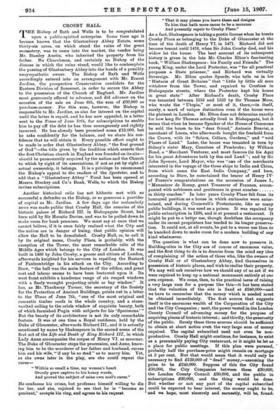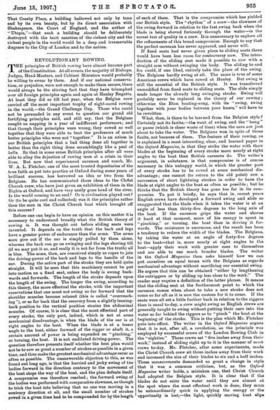CROSBY HALL.
fi'HE Bishop of Bath and Wells is to be congratulated upon a public-spirited enterprise. Some time ago it became known that the Glastonbury Abbey Estate, some thirty-six acres, on which stand the ruins of the great monastery, was to come into the market, the vendor being Mr. Stanley Austin, who inherited the property from his father. No Churchman, and certainly no Bishop of the diocese in which the ruins stand, would like to contemplate the passing of Glastonbury Abbey into the hands of a possibly unsympathetic owner. The Bishop of Bath and Wells accordingly entered into an arrangement with Mr. Ernest Jardine, the prospective Conservative candidate for the Eastern Division of Somerset, in order to secure the Abbey to the possession of the Church of England. Mr. Jardine most generously offered to advance, and did advance on the occasion of the sale on June 6th, the sum of 230,000 as purchase-money. For this sum, however, the Bishop is responsible to Mr. Jardine, as also for interest on the capital until the latter is repaid, and he has now appealed, in a letter sent to the Times of June 10th, for subscriptions to enable him to pay off the debt be has thus courageously and rightly incurred. He has already been promised some 215,000, but he asks confidently for the balance, and we share his con- fidence that he will obtain it. Every possible effort ought to be made in order that Glastonbury Abbey, "the first ground of God "—the title given by the tradition which asserts that the first Christian church in England was founded on its site— should be permanently acquired by the nation and the Church to which by right of its associations, if not as yet by right of actual ownership, it belongs. It is a privilege to recommend the Bishop's appeal to the readers of the Spectator, and to add that a "Glastonbury Abbey" Fund has been opened at Messrs. Stuckey and Co.'s Bank, Wells, to which the Bishop invites Subscriptions.
Another historical relic has not hitherto met with so successful a defender as the Bishop, or so generous a provider of capital as Mr. Jardine. A few days ago the nielancholy news was made public that Crosby Hall, the remains of the historic palace of Richard III. in Bishopsgate Street, had been Bold by Sir Horatio Davies, and was to be pulled down to make room for bank premises. We must say at once that we cannot believe, if it is once fairly realised what the City and the nation are in danger of losing, that public opinion will
• allow the Hall to be demolished. Crosby Hall, or, to call it by its original name, Crosby Place, is probably, with the exception of the Tower, the most remarkable relic of the Middle Ages which belongs to the City of London. It was built in 1466 by John Crosby, a grocer and citizen of London, afterwards knighted for his services in repelling the Bastard of Fanleonbridge in his attack on the City. According to Stow, "the ball was the main feature of the edifice, and great cost and labour seems to have been bestowed upon it. Its west front exhibits a handsome range of six cusped windows with a finely wrought projecting oriole or bay window." It has, as Mr. Thackeray Turner, the secretary of the Society for the Protection of Ancient Buildings, points out in a letter to the Times of June 7th, "one of the most original and romantic timber roofs in the whole country, and a stone' vaulted ceiling to the oriole window of exquisite beauty, both of which furnished Pugin with subjects for his 'Specimens.'" But the beauty of its architecture is not its only remarkable feature. It was at one time a Royal residence, held by the Duke of Gloucester, afterwards Richard Iii., and it is actually mentioned by name by Shakespeare in the second scene of the first act of the Life and Death of King Richard III., in which Lady Anne accompanies the corpse of Henry VI. as mourner. The Duke of Gloucester stops the procession, and Anne, know- ing him to be the murderer of her father and husband, curses him and his wife, "if any be so shad" as to marry him. Yet, as she owns later in the play, ere she could repeat the curse- " Within so small a time, my woman's heart
Grossly grew captive to his honey words,
And proved the subject of mine own soul's curse."
He oonfesses his crime, but professes himself willing to die for her, and she, rejoiced to see that he is "become so penitent," accepts his ring, and agrees to his request
" That it may please you leave these sad designs To him that bath more cause to be a mourner And presently repair to Crosby Place."
As a fact, Shakespeare is taking a poetic license when lie treats Crosby Place as belonging to the Duke of Gloucester at the time of the death of Henry VI. in 1471. Richard did not become tenant until 1476, when Sir John Crosby died, and his widow let the house. The best account of its subsequent history is given in the late Mr. Charles Elton's fascinating book, "William Shakespeare : his Family and Friends?' The young King, under the Lord Protector, was "for all practical purposes a State prisoner," and Richard was virtually Sovereign. Mr. Elton quotes Speede, who tells us in his " Historie of Great Britaine" that "little by little all men withdrew from the Tower, and repaired to Crosbies in Bishopsgate streete, where the Protector kept his house in great state." After Richard's death, Crosby Place was tenanted between 1516 and 1523 by Sir Thomas More, who wrote the "Utopia," or most of it, there,—in itself, surely, a mark of unique distinction even if the house were the plainest in London. Mr. Elton does not determine exactly for bow long Sir Thomas actually lived in Bishopsgate, but it seems that when he became Speaker of the House of COmmons he sold the house to his" dear friend," Antonio Bonvisi, a merchant of Lucca, who afterwards bought the freehold from the Crown, with its "Solara, Cellars, Gardens," and "void Places of Land." Later, the house was tenanted in turn by Sidney's sister Mary, Countess of Pembroke ; by William Bond, a "Merchant Venturer, and most famous (in his Age) for his great Adventures both by Sea and Land " ; and by Sir John Spencer, Lord Mayor, who was "one of the merchants interested in the voyage of the three ships to India and China, from which came the East India Company," and here, according to Stow, be entertained the bearer of Henry IV. of France's congratulations on the accession of James I., "Mounsieur de Rosny, great Treasurer of Pralines, accom- panied with noblemen and gentlemen in great number in thirty coaches." In later years Crosby Place fell from its honoured position as a house in which embassies were enter- tained, and during Cromwell's Protectorate, like so many public buildings, it was used as a prison. It was repaired by public subscription in 1836, and is at present a restaurant. It might be put to a better use, though doubtless the occupancy under its recent proprietors has tended to its longer preserva- tion. It could not, at all events, be put to a worse use than to be knocked down to make room for a modern building of any kind whatsoever.
The question is what can be done now to preserve it. Building-sites in the City are of pouree of enormous value, and the first thing to do is to dismiss from the mind any idea of complaining of the action of those who, like the owners of Crosby Hall or of Glastonbury Abbey, find themselves in possession of historic places, and wish to realise their property. We may well ask ourselves how we should any of us act if we were required to keep up a national monument entirely at our own expense. We come, then, to the practical issue of raising a very large sum for a purpose like this—it has been stated that the valuation of the site is fixed at 2240,000—and we have to remember that the money which is needed must be obtained immediately. The first source that suggests itself is the enormous wealth of the Corporation of the City and the City Companies ; next, the power vested in the London County Council' of advancing money for the purpose of acquiring places of historic interest; and thirdly, the generosity of the public. Surely these three sources should be sufficient to obtain at short notice eveb the very large sum of money required. The capital subscribed need not even be non- productive. Crosby Hall might continue, for instance, to exist as a presumably paying City restaurant, or it might be let as a place for public meetings. If this plan were pursued, probably half the purchase-price might remain on mortgage at 3 per cent. But that would mean that it would only be necessary to find £120,000 of "dead" money,—assuming the price to be £240,000. Suppose of this the City found 230,000, the City Companies between them 230,000, the London County Council 230,000, and the public in subscriptions 230,000, and the thing would be done. But whether or not any part of the capital subscribed could be expected to bear interest, the money ought to be, and we hope, most sincerely and earnestly, will be, found. That Crosby Place, a building hallowed not only by time and by its own beauty, but by its direct association with Shakespeare, the Court of England, and the author of " Utopia,"—that such a building should be deliberately destroyed with the tacit sanction of the richest city and the richest people in the world would be a deep and irremovable disgrace to the City of London and to the nation.







































 Previous page
Previous page